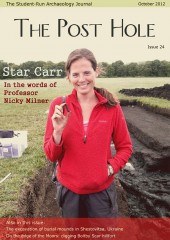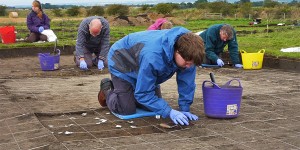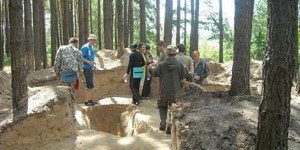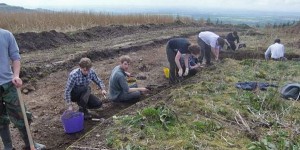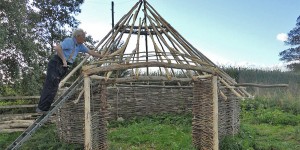Eight ways to make the most of your dissertation, Callum Reilly (BA Historical Archaeology)
Writing a dissertation is no small task. Unfortunately, there are few ‘secrets’, but there are several things you can do to improve your approach to research. When you are gathering large amounts of data from primary sources, or your own practical research, not to mention writing 10,000 words about it, taking a positive approach will help you stay on track. The eight tips below will help you do just that.
- Read as widely as possible. This may mean reading outside of your chosen topic; consider how your topic has been studied in other time periods or geographical regions. This may sadly mean you only use half of what you read, but it will help you pick out potential unanswered research questions.
- Make your notes your own. If you make notes as you read, don’t just summarise the article. You can also write down your own thoughts, though make sure to distinguish them in some way. These may include questions raised, other research the article relates to, methodological flaws, interpretative biases, and so on. Drawing on these points whilst you are writing will help you demonstrate critical thinking.
- Think thematically. Themes include settlement, subsistence, economy, power, landscape, identity, memory, religion and commemoration. Thinking about these wider issues, where relevant, is a great way to embed the research into ‘what has been done before’, thereby justifying your research.
- Think theoretically. Reading about, and incorporating some theory will strengthen your argument. This is because it will allow you to pick out theoretical flaws in other peoples arguments and in your own, in which case you can redevelop them to address the flaws.
- Ask why. This is yet another way of showing critical awareness, and there are countless questions available to answer. ‘Why has an area of study been ignored?’ ‘Why do we see the same data patterns across different regions?’ Even if your research confirms previous research, ask why we should or should not expect it to do so.
- Have original discussion points. Although having an original research aim is important, it is not always enough to rely on this. Finding something new to say might be daunting, but it could be as simple as saying whether a new methodology you have used has been successful, or explaining what studying a particular site tells us that another could not.
- Signpost clearly where necessary. Using signposting, such as ‘for example', ‘however’ or ‘despite this’, will help structure your argument. But be wary of overusing them. A paragraph full of ‘howevers’, or similar phrases, will suggest your argument is either not developed enough, or not structured clearly.
- And finally, make the most of your resources. In particular, be sure to have something to ask and something to show your supervisor for your supervisorials. Take some time to look at books such as The Craft of Research (Booth et al. 2003), which is a handy reference guide on writing arguments and presenting your research. You can also have a look at chapters 12 and 13 in The Archaeology Coursebook (Grant et al. 2008).
One last piece of advice: stay sane and take the time to put your dissertation to one side for a while. This will not only help you relax, but will also help you think more clearly and critically about your own research. One and a half years might seem like a short time to gather data and write 10,000 words in relation to your research question or aim, but it will at least prove enough time to understand what approaches work best for you. Good luck!
Recommended reading
- Booth, W.C., Colomb, G.G. and Williams, J.M. (2003) The Craft of Research (2nd ed.) Chicago: University of Chicago Press
- Grant, J., Gorin, S. and Fleming, N. (2008) The Archaeology Coursebook (3rd ed.) London: Routledge
Getting through the ups and downs of Third Year, Rachelle Martyn (BSc Bioarchaeology)
My original feelings towards third year were somewhere between excitement and fear of that moment when you eventually find yourself sitting on your bed in an oversized jumper, eating an entire box of celebrations, considering when it would be appropriate to call your mum in tears…
Thankfully, this year was (relatively) unheeded. In fact, third year brought for me, the best of my three years at university. It is difficult to give general advice because we all vary in the attitudes we hold towards work, the manner in which we deal with stress and our overall outlook on the degree. However, being on the severe end of the highly strung spectrum I can offer some pointers which may be used to varying degrees, depending on the nature of the individual student.
Firstly, and probably most importantly: start early. The module in your first term is great but you’ll find you neglect your dissertation. This is understandable given the work load, however, maintain a degree of attention towards your dissertation because doing so will put you in a much better position come second term. Furthermore, starting early helps both to alleviate last-minute panic and allows for work to be revised numerous times. Unfortunately, none of us can produce a detailed, structured, concise and bibliographically accurate piece of work in the first draft; so allowing yourself time to go over it can only make it better. Makes sense!
Secondly, and this is really just stressing the importance of time: edit everything. There’s nothing like the feeling of hitting that 10,000 word count on your dissertation. Over the course of last term we all found ourselves recognising the same look of relief on each others faces when we thought the end was nigh. Unfortunately, it wasn’t. Many of you will find yourselves over the word count, and all of you will have pictures, captions, graphs and illustrations which you need to include or rearrange. It is within the editing stage that you can turn your 10,000 words of well researched transcript into something which is as impressive aesthetically as it is academically. However, it is easy to underestimate this process. I gave myself two weeks for editing and was still finding text boxes flying around my pages until the morning before printing. You just need to try and judge it right.
Finally, enjoy your modules! Third year really allows you to refine your skills as an academic and, if you want to, specialise these and your knowledge, within a field that you truly enjoy. My modules allowed me to immerse myself in subjects that did not just encompass all aspects of biological archaeology, but also captured my imagination and made me want to learn all that I could in the short time I had. By the time they came to an end, I had not merely discovered unsung heroes of archaeological sub-disciplines; I had also come to appreciate, in conjunction with the dissertation, the scale of what we as third years were undertaking.
And this is ultimately what third year was for me. Ignoring the stress, the setbacks and the hours in front of a computer, the last year of your undergraduate degree will show you just how far you have come as an academic. By the time you graduate you will have produced a dissertation the credit for which is completely yours, obtained invaluable practical and collaborative experience and refined your skills as a researcher, an orator, and, most importantly, an archaeologist!
There is no denying the importance of third year and the work you will undertake during this time. However, as you stand on the precipice of your final year, think back to what you have already achieved. In a year’s time your career as an undergraduate will be over. Time really does fly so yes, ensure you start early, do the research and edit thoroughly, but most of all, make the most of the time you have left. There really is nothing like it.


